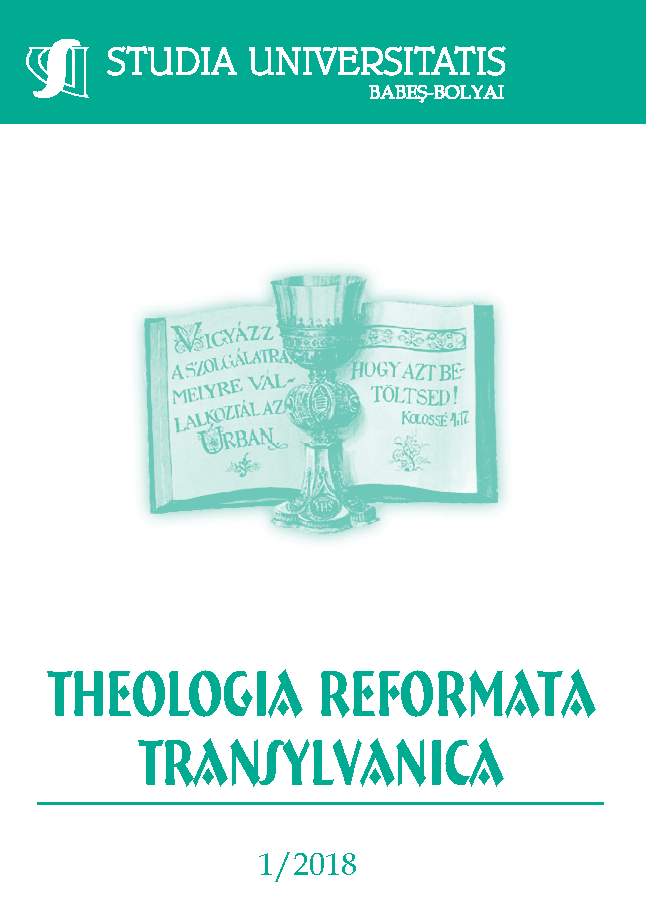A házasságban élő keresztény lét lelkisége és teológiája
DOI:
https://doi.org/10.24193/subbtref.63.1.03Keywords:
marriage, celibacy, adultery, divorce, church, Christ, sacrament.Abstract
Spirituality and Theology of the Married Christian Being.
The „Milieu” where a modern Christian marriage exists, seems to be among not to easy circumstances. It is a double sided situation behind of you with God when you are together with your husband or wife, and behind of you with your wife or husband, when you are together with God. Although, we believe that in the Holy Spirit this two parts can be united into one whole. The marriage as institution is older than Christianity, but it is created and blessed by God from the beginning what’s the source of all holiness or sacrament. Christ gave it to the fullness when He raised it up to Himself. He is the only fundament in what all things stand up and fulfill sacraments, too. The marriage is a sacrament both in the Catholic and Orthodox Church, but from the point of you the of marriage’s mystery, they have some differences in their details. The scholastic Latin and the post patristic eastern Churches perspective the foundation of sacraments like a creation ex nihilo, a discontinuing phenomena, and the sign of the sacraments are caused by Jesus Christ, the Incarnated Son of God. However the patristic tradition and the modern emigrant orthodox theology maintain that the foundation of the sacraments are in the fulfillments of sacrament’s sig or symbol which is created by God in the beginning intentionally in order to be able to reach its own final purpose. The “Love spiral” involves nine different grades which follow each-other again and again. In a really deep love connection these Moments of love need to be realized gradually. These grade are: 1. Calling, 2. Identity, 3. Intimacy, 4. confrontation, 5. Conversion, 6. Reconciliation, 7. Communion, 8. Commitment, 9. Mission. Conclusion. There must be peaceful and friendly but professional confrontations between different parts of the divided Churches to find and looking for together the original place and status of the marriage in the Christianity. Marriage, Church, Sacraments, and particularly Eucharist are united in Jesus Christ ever and forever. This is the reason why Christian sacramental marriage make part of the sacraments of the Church and of Christ as Bride and Bridegroom.
References
Alfejev, Hilarion: A hit titka. Budapest, 2005.
Alszeghy Zoltán SJ: A házasság. In: Teológiai vázlatok VI. Budapest, 1983.
Beinert, Wolfgang: Dogma/dogmatikai kijelentés (szócikk). In: Wolfgang Beinert (szerk.): A katolikus dogma lexikona. Budapest, 2004.
Breuning, Wilhelm: Szentháromság (szócikk). In: Wolfgang Beinert (szerk.): A katolikus dogma lexikona. Budapest, 2004. 538–540.
Chantraine, Georges: Exegesis and contemplation in the work of Hans Urs von Balthasar. In Communio 16, (1989) Fall. 366–383.
Clément, Olivier: Kérdések az emberről (ford. Baán István). Budapest, 2004.
De Chardin, Theilhard: Benne élünk. Az Isteni Miliő. Tanulmány a belső életről. Párizs, 1965.
Dignitatis Humanae 1797–1812. II. vatikáni zsinat „Nyilatkozat” a vallásszabadságról. SZIT, Budapest 31986.
Euchologion. Görögkatolikus Egyházi Szerkönyv. Budapest, 1964.
Farkasfalvi Dénes: A lelki élet teológiája. In: Teológiai vázlatok VI. Budapest, 1983.
Gánóczi Sándor: Rossz (szócikk). In: Wolfgang BEINERT (szerk.): A katolikus dogma lexikona. Budapest, 2004. 524–526.
Gyökössi Endre: A Hogyan? – Három meditáció a meditációról. Budapest, 2000.
Häring, Bernard: Másképp is lehetne. Budapest, 1993.
Hermenegild, Hermann OFM: Promptuarium Patristicum. Budapest, 1937.
Hilberath, Bernd Jochen: Pneumatológia. In: Theodor Schneider (szerk.): A dogmatika kézikönyve I. Budapest, 1998.
Koch, Günter: A házasság szentsége (szócikk). In: Wolfgang Beinert (szerk.): A katolikus dogma lexikona. Budapest, 2004.
Levél Diognétoszhoz. In: Vanyó László (szerk.): Apostoli Atyák. Ókeresztény Írók III. Budapest, 1980.
Meyendorff, John: A Házasság Misztériuma. Budapest. 2009. (Marriage. An Orthodox Perspective. New York 31984.)
Nagy Szent Gergely: A lelkipásztor kézikönyve. Budapest, 2004.
Nemes Ödön SJ.: Párbeszélgetés. Kapcsolatépítő munkafüzet házasság előtt állóknak. Budapest, 2006.
Nocent, A.: Il matrimonio cristiano. In: La liturgia, i sacramenti: teologiae storia della celebratione. Genova 41995.
Nocke, Franz-Josef: Házasság. In: Theodor Schneider (szerk.): A dogmatika kézikönyve II. Budapest, 1997.
Örsy László SJ: Theology and Canon Law: New Horizons for legislation and Interpretation. Collegeville, Minnesota 1992.
Ratzinger, Joseph: Beszélgetés a hitről (Vittorio Messorival). Budapest, 1990.
Schmemann, Alexander: A Világ életéért (ford.: Buji Ferenc). Budapest, 2001.
Shütz Antal: Dogmatika II. Budapest, 1937.
Shütz Antal: A házasság. Budapest, 1932.
Söveges Dávid OSB: Fejezetek a lelkiség történetéből. Pannonhalma, 1993.
Szabó Ferenc SJ: Lélekben és Igazságban. Róma, 1986.
Ulrich, Lothar: A dogmatikai témakörök szisztematikus áttekintése. In: Wolfgang Beinert (szerk.): A katolikus dogma lexikona. Budapest, 2004. 27–37.
Urs von Balthasar, Hans: A három nap teológiája. Budapest, 2000.
Urs von Balthasar, Hans: Az alak szemlélése. A dicsőség felfénylése: Teológiai esztétika 1. Budapest, 2004.
Urs von Balthasar, Hans: Das betrachtende Gebet. Einsiedeln, 1955.
Urs von Balthasar, Hans: Prayer. New York, 1967.
Vanyó László: Apostoli Atyák. Ókeresztény Írók. III. Budapest, 1988.
Vlachos, Hierotheos: Bevetés a keleti keresztény lelkiségbe. Budapest, 1998.
Ware, Kallistos: Az ortodox út. Budapest, 2002.
Weil, Simone: Szerencsétlenség és Istenszeretet. Budapest, 1998.
XVI. Benedek: Deus caritas est. Budapest, 2006.
Downloads
Published
How to Cite
Issue
Section
License
Copyright (c) 2018 Studia Universitatis Babeș-Bolyai Theologia Reformata Transylvanica

This work is licensed under a Creative Commons Attribution-NonCommercial-NoDerivatives 4.0 International License.






